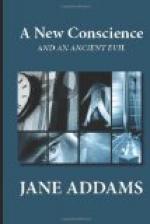When the judgment of her peers becomes not less firm but more kindly, the self-supporting girl will have a safeguard and restraint many times more effective than the individual control which has become so inadequate, or the family discipline that, with the best intentions in the world, cannot cope with existing social conditions.
The most perplexing case that comes before the philanthropic organizations trying to aid and rescue the victims of the white slave traffic, is of the type which involves a girl who has been secured by the trafficker when so lonely, detached and discouraged that she greedily seized whatever friendship was offered her. Such a girl has been so eager for affection that she clings to even the wretched simulacrum of it, afforded by the man who calls himself her “protector,” and she can only be permanently detached from the life to which he holds her, when she is put under the influence of more genuine affections and interests. That is doubtless one reason it is always more possible to help the girl who has become the mother of a child. Although she unjustly faces a public opinion much more severe than that encountered by the childless woman who also endeavors to “reform,” the mother’s sheer affection and maternal absorption enables her to overcome the greater difficulties more easily than the other woman, without the new warmth of motive, overcomes the lesser ones. The Salvation Army in their rescue homes have long recognized this need for an absorbing interest, which should involve the Magdalen’s deepest affections and emotions, and therefore often utilize the rescued girl to save others.
Certainly no philanthropic association, however rationalistic and suspicious of emotional appeal, can hope to help a girl once overwhelmed by desperate temptation, unless it is able to pull her back into the stream of kindly human fellowship and into a life involving normal human relations. Such an association must needs remember those wise words of Count Tolstoy: “We constantly think that there are circumstances in which a human being can be treated without affection, and there are no such circumstances.”




